|
Journal of a Sabbatical |
|||||||
|
China Trip 2000 |
|
change faces, spit fire |
|||||
|
|
|
|
|||||
|
Quote of the Day: Though a tree writes no memorial, yet people understand -- Du Fu - Song of an Old Cypress Today's Reading: The Story of the Stone (a.k.a. Dream of the Red Chamber) by Cao Xuequin
Photos: Du Fu's Cottage Ticket to Du Fu's Cottage Green Trees and Green River at Du Fu's Cottage Writing Desk Ticket from Shufengyayun Tea House Change Faces Actor Showing His Real Face - from the poster the tea house manager gave us Woman Juggler Spit Fire Rolling Light Stick Puppet - from the poster Stick Puppet 2 - my own photo
|
|
Somehow, the whole time we were discussing the itinerary for this Tibet trip and hearing we were going to visit "the thatched cottage" on our stopover in Chengdu it never dawned on me that it was Du Fu's thatched cottage. As our tour guide, Mona, who met us at the airport was telling us the story of the cottage we were about to visit, light dawned on marble head and I got way more excited about this little diversion.
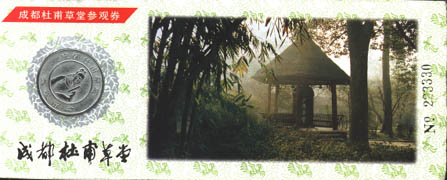
I could easily have spent an entire day at the cottage. I wanted to take the experience with me. The souvenir bug that bit me this morning at the Temple of the Azure Clouds in Xiangshan bites me again in Chengdu and I end up with a scroll painting of the cottage surrounded by dense vegetation. I have to have it, despite the fact that I have no place to hang it at home and I'll have to carry it around Tibet with me. 
The Shufengyayun Tea House is near the Du Fu Cottage. It's a big barn-like space furnished with high-backed bamboo chairs and small tables set with covered tea cups and plates of peanuts. They serve the tea from an eagle tea can and the hot water from a copper kettle with a very long spout for reaching to the middle of the aisles. It's quite crowded with people packed in everywhere. I see maybe three other non-Chinese faces besides ours. The back of the ticket says the building has the style of Old West Shu and is supposed to make the people "feel the folk customs and folkway of the Old West Shu". I can't vouch for that because I am ignorant of the folkways of Old West Shu. The program for the evening includes drum and gong music, a juggling act, stick puppets, and Sichuan Opera. I'd never heard of Sichuan opera before and assumed it was pretty much like Peking Opera. Not so. Sichuan opera features a series of stunts including: change faces, spit fire, and rolling light. We're told these stunts are unique to Sichuan opera and we definitely won't see them anywhere else.
Between acts a guy dressed in black silk pants and jacket with black cap, runs across the stage with a placard in Chinese and English telling you what's next. The juggler keeps everything from clay pots to round pieces of cloth in the air using both hands and feet. I don't know if that's a Sichuan specialty too, but it's impressive to watch. Changing faces (bian lian in Chinese) is a performance art technique of high-speed changing of face masks. Instead of using painted on face makeup, Sichuan opera performers change their "makeup" suddenly on the stage. Well, it's not really makeup, it's masks. They change their masks so quickly that the audience barely notices it. I kept trying to catch the moment of the change but never did. With all the leaping around and mask changing, it seems like there's a cast of thousands on the stage instead of a couple of players doing multiple roles.
The MC reminds us constantly in Chinese and English of the uniqueness of Sichuan opera - between every act. I start to wonder what parts of China all these people in the audience are from. Are they as amazed and impressed as the handfull of foreigners? She tells us that "rolling light" is another skill unique to Sichuan. These actors must like playing with fire. Besides spitting it, they do amazing stunts with it.
While we're watching the show, our tea cups are refilled constantly. Basically if you take a sip, someone tops up your cup. Also while we're engrossed in the show, Mona disappears and returns a few times. We think nothing of it. Then it's time to leave and get a few hours sleep before the early (really early) flight to Lhasa. That's when we discover that our driver has dumped all our luggage in the tea house's office and taken off. He apparently had yet more words with Mona. So we sit in the office while Mona tries to find us a cab or another driver or something. The manager of the tea house comes in and gives us each a poster (from which some of the pictures in this entry were scanned.) Finally, we get a cab to our hotel. Only then do we find out Mona is going to wake us up at 4:00 AM to get to the airport. Four o'clock in the morning! Yikes. |
|||||
|
Copyright © 2000, Janet I. Egan |
||||||
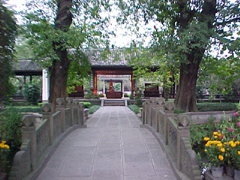 When
they served lunch on the flight to Chengdu I had this
bizarre moment wondering "how am I going to eat this without
chopsticks?" It took me several seconds to realize "oh wait,
here's a fork." Clearly I have been in China too long.
When
they served lunch on the flight to Chengdu I had this
bizarre moment wondering "how am I going to eat this without
chopsticks?" It took me several seconds to realize "oh wait,
here's a fork." Clearly I have been in China too long.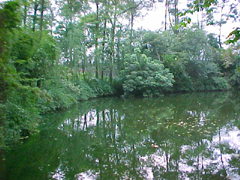 Du
Fu was probably China's greatest poet. He's certainly the
one most Westerners have heard of - along with his friend
and correspondent Li Po. Born in Henan in 712, Du Fu left
home when he was 20. He served as some kind of government
official for awhile (like 10 years) but fled to Chengdu
after being captured by rebels during an uprising. He built
himself a humble cottage by the Brocade River. I suspect the
original cottage was far less grand than this re-creation.
This shrine to poetry is full of gorgeous bamboo and all
kinds of greenery. And birds. I heard so much bird song in
the trees by the river that I was convinced it must be a
tape. Nope. Real birds. Just like in the poems.
Du
Fu was probably China's greatest poet. He's certainly the
one most Westerners have heard of - along with his friend
and correspondent Li Po. Born in Henan in 712, Du Fu left
home when he was 20. He served as some kind of government
official for awhile (like 10 years) but fled to Chengdu
after being captured by rebels during an uprising. He built
himself a humble cottage by the Brocade River. I suspect the
original cottage was far less grand than this re-creation.
This shrine to poetry is full of gorgeous bamboo and all
kinds of greenery. And birds. I heard so much bird song in
the trees by the river that I was convinced it must be a
tape. Nope. Real birds. Just like in the poems.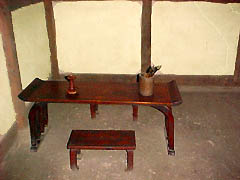 I
somehow doubt this is Du Fu's actual writing desk, probably
a facsimile. I can picture him sitting here writing one of
his 10,000 poems (about 200 or so of his 10,000 poems were
written here at the cottage). It was getting dark when we
were touring the cottage - wall clock time here bears no
relation to the position of the sun as the entire country is
one time zone - and we found ourselves rushing a little bit
to see everything. Plus, Mona's English is not very good so
I'm hard pressed to understand what she's telling us.
There's a gnarled old cypress stump on the porch of one of
the cottage buildings and I think Mona was telling us this
is the remains of the actual cypress tree from Song of an
Old Cypress, but I'm not sure. Maybe like the desk it's
a reconstruction or a replacement. It is really gnarly and
old though and I get that tingling feeling of being in
contact with a historic specimen so maybe it is the
Old Cypress.
I
somehow doubt this is Du Fu's actual writing desk, probably
a facsimile. I can picture him sitting here writing one of
his 10,000 poems (about 200 or so of his 10,000 poems were
written here at the cottage). It was getting dark when we
were touring the cottage - wall clock time here bears no
relation to the position of the sun as the entire country is
one time zone - and we found ourselves rushing a little bit
to see everything. Plus, Mona's English is not very good so
I'm hard pressed to understand what she's telling us.
There's a gnarled old cypress stump on the porch of one of
the cottage buildings and I think Mona was telling us this
is the remains of the actual cypress tree from Song of an
Old Cypress, but I'm not sure. Maybe like the desk it's
a reconstruction or a replacement. It is really gnarly and
old though and I get that tingling feeling of being in
contact with a historic specimen so maybe it is the
Old Cypress. If
I'd known what on earth Mona meant by changing faces and
spitting fire I might have gotten more excited about that
too. After a delicious dinner featuring ma po tofu and much
more food than any of us can eat, we're off to see change
faces and spit fire. Our driver doesn't seem to know exactly
how to get there and he and Mona get into a fierce argument.
I remember passing the same storage area for carnival rides
several times. That reminds me, strangely enough, of home -
the carnival ride and fried dough storage lot on Bridge Road
near the cat shelter. What a strange thing to evoke home! We
do finally get to the tea house, having missed the first
show. Fortunately, there are several shows tonight.
If
I'd known what on earth Mona meant by changing faces and
spitting fire I might have gotten more excited about that
too. After a delicious dinner featuring ma po tofu and much
more food than any of us can eat, we're off to see change
faces and spit fire. Our driver doesn't seem to know exactly
how to get there and he and Mona get into a fierce argument.
I remember passing the same storage area for carnival rides
several times. That reminds me, strangely enough, of home -
the carnival ride and fried dough storage lot on Bridge Road
near the cat shelter. What a strange thing to evoke home! We
do finally get to the tea house, having missed the first
show. Fortunately, there are several shows tonight.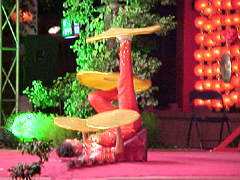 The
drum and gong group also features a guy playing the erhu, a
stringed instrument I've only ever heard on recordings
before. I'm told Sichuan opera usually just has perscussion,
so I wasn't expecting the erhu. It's a treat to hear it
live.
The
drum and gong group also features a guy playing the erhu, a
stringed instrument I've only ever heard on recordings
before. I'm told Sichuan opera usually just has perscussion,
so I wasn't expecting the erhu. It's a treat to hear it
live.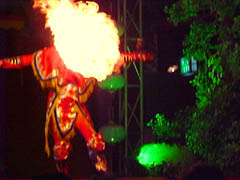 Spit
fire is pretty obvious. The performers spit fire. There's no
other way to describe it. They don't eat fire like American
carnival acts, they spit it like dragons. It's startling
even when you know it's coming. In the picture I took, it
looks like the performer's head is on fire and you can't see
his head for the flames. The other picture is from a
souvenir poster and taken from a different angle so you can
see the guy's head. When he's standing on the edge of the
stage and the flames are coming right at you, it's hard to
hold onto your tea cup, never mind take a picture!
Spit
fire is pretty obvious. The performers spit fire. There's no
other way to describe it. They don't eat fire like American
carnival acts, they spit it like dragons. It's startling
even when you know it's coming. In the picture I took, it
looks like the performer's head is on fire and you can't see
his head for the flames. The other picture is from a
souvenir poster and taken from a different angle so you can
see the guy's head. When he's standing on the edge of the
stage and the flames are coming right at you, it's hard to
hold onto your tea cup, never mind take a picture!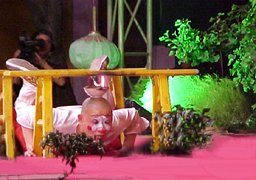 Rolling
light involves doing complex physical comedy while balancing
a flaming bowl on one's head. The scene we saw involved a
husband and wife arguing over the husband's gambling. The
wife kept giving the husband progressively weirder and more
dangerous stunts to perform. Without understanding a word of
dialogue, I found this screamingly funny. The rolling light
guy could move his body in a few thousand ways I've never
seen before and yet not knock that flaming bowl off his
head. He looked like he was made of rubber.
Rolling
light involves doing complex physical comedy while balancing
a flaming bowl on one's head. The scene we saw involved a
husband and wife arguing over the husband's gambling. The
wife kept giving the husband progressively weirder and more
dangerous stunts to perform. Without understanding a word of
dialogue, I found this screamingly funny. The rolling light
guy could move his body in a few thousand ways I've never
seen before and yet not knock that flaming bowl off his
head. He looked like he was made of rubber. 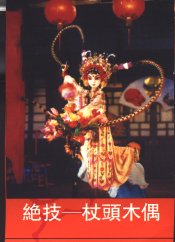 At
Shufengyayun Tea House stick puppets change faces and spit
fire too. According to the announcer woman who introduces
each act, we won't see puppets doing this anywhere else.
She's probably right. The puppets did
At
Shufengyayun Tea House stick puppets change faces and spit
fire too. According to the announcer woman who introduces
each act, we won't see puppets doing this anywhere else.
She's probably right. The puppets did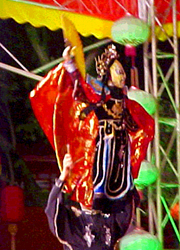 not do rolling light or play drums and gongs but they were
very expressive.
not do rolling light or play drums and gongs but they were
very expressive.